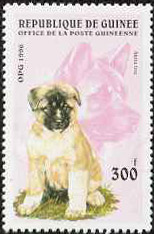
Chesapeake Bay Retriever: A Complete Handbook
Chesapeke Bay Retrievers look a little like chocolate Labs with curly coats, though the shade is different, and Chessies are much more serious dogs than Labs. They are strong-willed dogs, and aren't as affectionate with strangers as Labs are, preferring to reserve their affections for their owners and human family. They are very trainable, though it helps to set out ground rules from when they are pups, because they can be a bit pushy, and like to have their own way. They can perform well in obedience activities, though don't stand as much repetition in training as Labs can.
The job they were designed to do is retrieve, which they can do tirelessly. They enjoy swimming, and like to get muddy. Bored chessies will tend to chew, and they need a supply of legitimate chew objects to ensure that they don't chew your posessions. They can be entertained with ball games, but do like to get out and about, so it's best not to choose a Chessie unless you enjoy a daily walk. Well trained and well socialized Chessies are generally good with children who respect them, especially if the children play games they like, such as retrieving. Children should always make Chessies sit before throwing the ball, because these are such powerful dogs they can easily knock children over. It also helps if children learn the basics of training, so that the dog learns the same rules from all the family. Chesapeke retrievers aren't especially playful with other dogs, and can be a little cantankerous, but well-socialized Chessies will usually tolerate dogs they meet on walks.
Chesapeke Retrievers aren't very barky dogs, but they are serious enough to take on the role of guard dogs. Chessies do need extensive and ongoing socialization, even, and perhaps especially if you want them to be guard dogs, since they have a protective and territorial streak, and you want delivery people and visiting children to be safe. Chessies have a powerful presence and will look serious if they meet uninvited visitors, even after socialization - they don't have the same open 'love everybody' character of Golden and Labrador Retrievers.
Common health problems affecting the breed include hip dysplasia, von Willebrands, hypothyroidism and eye trouble.
Stacy Kennedy's book is a short, well illustrated guide to Chesapeke retrievers. The history of the breed is well covered, as is their general care and training. Anyone who wants to get the full potential from their Chessie will need a more in-depth guide to retriever training, but this is a good general introduction by someone who fully appreciates this dignified breed.



